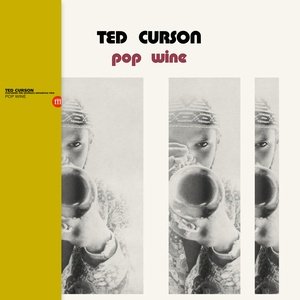Ted Curson: Pop Wine (SOUFFLE CONTINU)
From our own Greg Bennetts:
“Continuing their reissues of the great Futura label, acclaimed Paris-based record store and imprint Souffle Continu brings us this offering. Pop Wine has Ted Curson alongside top French musicians Georges Arvanitas on piano, double bassist Jacky Samson, and Charles Saudrais on drums. The generosity offered to each other while playing is noticeable throughout the record, especially by Curson.
Tender and ferocious, a cross-section of the currents of jazz and beyond in 1972, this record stuns. Pushing in and out of an array of styles, modal, traditional, free, and Latin, but never remaining in one place for too long. Hinting at the outskirts of fusion but never delving any further (thankfully for many), Pop Wine has even less to do with any reconsiderations/conflagrations of pop by jazz musicians (again, thank you). Instead what lies on this supremely underappreciated album is fully-formed music performed by masters of their day. Players lay out and remain so, sometimes for minutes, not measures.
Opening with a walking bass riff (asking to be sampled and then flipped), Pop Wine slips into its eponymous first track without giving too much away of what is to come. Soaring over the low-end before backing out, stepping back in, the bandleader gathers the troops as the record takes shape.
The bass continues to lead, thundering into “L.S.D. Takes a Holiday,” the trumpet laying restless above the intense rhythm. A questioning line, answered in short bursts until Curson begins his monologue, hastily reaching the upper registers, tickling the notes, occasionally straining, making explicit the tone of the piece. No bad trip is possible here.
Side Two begins with an emotional high point of the LP, stand-out track “Quartier Latin.” A hazy gathering of the musicians, quiet, without form, before fully charging into its dominant riff. Bass throbs, as piano propels them deeper, sharp and percussive alongside the chattering drums. Channeling Art Davis’s bass on Coletrane’s Olé, it rolls along with Curson spitting out bursts of horn on top of clangs, tweaks, and bends. Eventually reaching its peak, the players give out furiously before the sound flutters down to earth nearing silence with Samson dropping the heady time, now steadily bowing with grace (again, difficult not to hear reflections of the amazing Olé from a decade before).
“Filp Top” closes the album, again with Curson furiously dialing in messages from the ether in his impeccable tone, impossible to ignore influence of that really big-name trumpeter who originally brought him from Philadelphia to New York. As though trying to get in as much as possible before the tape runs out, the song cycles around giving everyone plenty of room to spread out and finish their thoughts.
Then in a flash, one more turnaround, and gone.”
Georges Arvanitas - piano
Jacky Samson - bass
Charles Saudrais - drums
From our own Greg Bennetts:
“Continuing their reissues of the great Futura label, acclaimed Paris-based record store and imprint Souffle Continu brings us this offering. Pop Wine has Ted Curson alongside top French musicians Georges Arvanitas on piano, double bassist Jacky Samson, and Charles Saudrais on drums. The generosity offered to each other while playing is noticeable throughout the record, especially by Curson.
Tender and ferocious, a cross-section of the currents of jazz and beyond in 1972, this record stuns. Pushing in and out of an array of styles, modal, traditional, free, and Latin, but never remaining in one place for too long. Hinting at the outskirts of fusion but never delving any further (thankfully for many), Pop Wine has even less to do with any reconsiderations/conflagrations of pop by jazz musicians (again, thank you). Instead what lies on this supremely underappreciated album is fully-formed music performed by masters of their day. Players lay out and remain so, sometimes for minutes, not measures.
Opening with a walking bass riff (asking to be sampled and then flipped), Pop Wine slips into its eponymous first track without giving too much away of what is to come. Soaring over the low-end before backing out, stepping back in, the bandleader gathers the troops as the record takes shape.
The bass continues to lead, thundering into “L.S.D. Takes a Holiday,” the trumpet laying restless above the intense rhythm. A questioning line, answered in short bursts until Curson begins his monologue, hastily reaching the upper registers, tickling the notes, occasionally straining, making explicit the tone of the piece. No bad trip is possible here.
Side Two begins with an emotional high point of the LP, stand-out track “Quartier Latin.” A hazy gathering of the musicians, quiet, without form, before fully charging into its dominant riff. Bass throbs, as piano propels them deeper, sharp and percussive alongside the chattering drums. Channeling Art Davis’s bass on Coletrane’s Olé, it rolls along with Curson spitting out bursts of horn on top of clangs, tweaks, and bends. Eventually reaching its peak, the players give out furiously before the sound flutters down to earth nearing silence with Samson dropping the heady time, now steadily bowing with grace (again, difficult not to hear reflections of the amazing Olé from a decade before).
“Filp Top” closes the album, again with Curson furiously dialing in messages from the ether in his impeccable tone, impossible to ignore influence of that really big-name trumpeter who originally brought him from Philadelphia to New York. As though trying to get in as much as possible before the tape runs out, the song cycles around giving everyone plenty of room to spread out and finish their thoughts.
Then in a flash, one more turnaround, and gone.”
Georges Arvanitas - piano
Jacky Samson - bass
Charles Saudrais - drums
From our own Greg Bennetts:
“Continuing their reissues of the great Futura label, acclaimed Paris-based record store and imprint Souffle Continu brings us this offering. Pop Wine has Ted Curson alongside top French musicians Georges Arvanitas on piano, double bassist Jacky Samson, and Charles Saudrais on drums. The generosity offered to each other while playing is noticeable throughout the record, especially by Curson.
Tender and ferocious, a cross-section of the currents of jazz and beyond in 1972, this record stuns. Pushing in and out of an array of styles, modal, traditional, free, and Latin, but never remaining in one place for too long. Hinting at the outskirts of fusion but never delving any further (thankfully for many), Pop Wine has even less to do with any reconsiderations/conflagrations of pop by jazz musicians (again, thank you). Instead what lies on this supremely underappreciated album is fully-formed music performed by masters of their day. Players lay out and remain so, sometimes for minutes, not measures.
Opening with a walking bass riff (asking to be sampled and then flipped), Pop Wine slips into its eponymous first track without giving too much away of what is to come. Soaring over the low-end before backing out, stepping back in, the bandleader gathers the troops as the record takes shape.
The bass continues to lead, thundering into “L.S.D. Takes a Holiday,” the trumpet laying restless above the intense rhythm. A questioning line, answered in short bursts until Curson begins his monologue, hastily reaching the upper registers, tickling the notes, occasionally straining, making explicit the tone of the piece. No bad trip is possible here.
Side Two begins with an emotional high point of the LP, stand-out track “Quartier Latin.” A hazy gathering of the musicians, quiet, without form, before fully charging into its dominant riff. Bass throbs, as piano propels them deeper, sharp and percussive alongside the chattering drums. Channeling Art Davis’s bass on Coletrane’s Olé, it rolls along with Curson spitting out bursts of horn on top of clangs, tweaks, and bends. Eventually reaching its peak, the players give out furiously before the sound flutters down to earth nearing silence with Samson dropping the heady time, now steadily bowing with grace (again, difficult not to hear reflections of the amazing Olé from a decade before).
“Filp Top” closes the album, again with Curson furiously dialing in messages from the ether in his impeccable tone, impossible to ignore influence of that really big-name trumpeter who originally brought him from Philadelphia to New York. As though trying to get in as much as possible before the tape runs out, the song cycles around giving everyone plenty of room to spread out and finish their thoughts.
Then in a flash, one more turnaround, and gone.”
Georges Arvanitas - piano
Jacky Samson - bass
Charles Saudrais - drums

